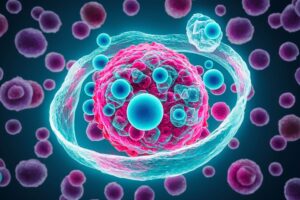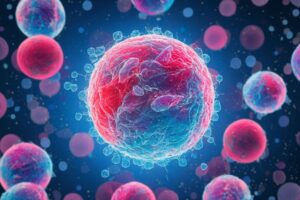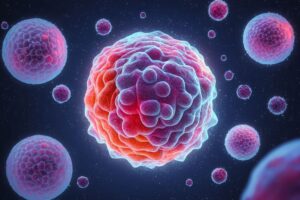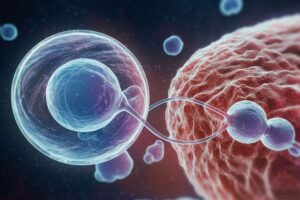What is Phosphatidylcholine and it’s Essential Role in Cellular Health?
Phosphatidylcholine, a vital component of cell membranes, plays a crucial role in maintaining cellular health and function. This phospholipid, also known as lecithin, is essential for various biological processes.
This phospholipid is not only essential for the structural integrity of cell membranes but also contributes to various cellular processes, including signal transduction and lipid metabolism. Understanding the significance of phosphatidylcholine in cellular health is key to comprehending its impact on overall well-being.
In this article, we delve into the structure, function, its essential role in cellular health and benefits of phosphatidylcholine, as well as explore its sources and potential therapeutic applications for human health.

Table of Contents
ToggleWhat is Phosphatidylcholine and How is it Produced in the Body?
Phosphatidylcholine, also known as lecithin, is a type of phospholipid that is crucial for the structure and function of cell membranes in the body. It is a major component of cell membranes and plays a key role in maintaining the integrity of these membranes, as well as facilitating cellular communication and signaling. Phosphatidylcholine is also involved in lipid metabolism and transport within the body.
Phosphatidylcholine is produced in the body through a process known as phospholipid biosynthesis. This process involves the conversion of choline, a water-soluble nutrient found in foods such as eggs, liver, and nuts, into phosphatidylcholine.
Choline is first converted into phosphocholine by the enzyme choline kinase, and then phosphocholine is further modified to form phosphatidylcholine through a series of enzymatic reactions.
Phosphatidylcholine can also be obtained through dietary sources, as the body is able to convert dietary choline into phosphatidylcholine.
The production of phosphatidylcholine is essential for maintaining the structural and functional integrity of cell membranes, and for ensuring proper cellular function. Phospholipid biosynthesis is a tightly regulated process that is influenced by various factors, such as dietary intake of choline, hormonal signals, and metabolic pathways.
Imbalances in phosphatidylcholine production can lead to disruptions in cell membrane integrity and function, which can have serious implications for overall health and cellular function.
Therefore, understanding the mechanisms involved in phosphatidylcholine production is essential for maintaining cellular homeostasis and promoting optimal health.
Read more about “The Impact of Arteriosclerosis on Cardiovascular Health”
Structure and Function of Phosphatidylcholine in Cells
Phosphatidylcholine is a crucial component of cell membranes, accounting for a significant proportion of the lipid bilayer that surrounds and protects the cell. This phospholipid consists of a glycerol backbone linked to two fatty acid chains and a phosphocholine head group.
The hydrophobic tails of phosphatidylcholine interact with other lipids in the membrane, providing stability, while the hydrophilic head group faces outwards and interacts with the aqueous environment both inside and outside of the cell. This amphipathic nature allows phosphatidylcholine to contribute to the selective permeability of the membrane, regulating the passage of molecules and ions in and out of the cell.

In addition to its structural role in cell membranes, phosphatidylcholine plays a vital function in cellular signaling and metabolism. As a major source of the essential nutrient choline, phosphatidylcholine is involved in the synthesis of the neurotransmitter acetylcholine, which is critical for nerve function and muscle contractions.
Phosphatidylcholine also serves as a precursor for signaling molecules such as diacylglycerol and phosphatidic acid, which play roles in cellular growth and proliferation.
Furthermore, phosphatidylcholine can be converted into lipid compounds called phospholipid-derived mediators, which are key regulators of inflammatory responses and immune functions in the body. Overall, the structure and function of phosphatidylcholine are essential for the integrity and functionality of cells in various physiological processes.
Read more about “The Link between Adrenal Stress Fat and Stubborn Belly Fat!”
Why Phosphatidylcholine is Important in Cellular Health?
Phosphatidylcholine, a crucial component of cell membranes, plays a vital role in cellular health. As the most abundant phospholipid in cell membranes, phosphatidylcholine is responsible for maintaining the structural integrity of the cell and regulating its permeability. Additionally, phosphatidylcholine is essential for proper cell signaling, as it serves as a precursor for important signaling molecules such as diacylglycerol and inositol triphosphate.
Furthermore, phosphatidylcholine is involved in lipid metabolism and acts as a reservoir for choline, an essential nutrient for brain health. Overall, the presence of phosphatidylcholine is critical for various cellular functions and its importance in maintaining cellular health cannot be overstated.
Read more about “What are the Causes and Symptoms of Amputation Disease and How to Treat?”
Role of Phosphatidylcholine in Maintaining Cell Membrane Structure
As a major phospholipid, phosphatidylcholine serves as the primary building block for the lipid bilayer that surrounds cells, providing stability and integrity to the membrane. Phosphatidylcholine molecules have a special chemical makeup with hydrophilic head groups and hydrophobic tails.
This structure enables them to create a barrier between the watery environment inside and outside of the cell. This barrier not only protects the cell from harmful substances but also regulates the movement of ions and molecules across the membrane through selective permeability.
Additionally, phosphatidylcholine plays a key role in cell signaling processes by serving as precursors for essential signaling molecules such as diacylglycerol and sphingomyelin. In short, phosphatidylcholine is indispensable for maintaining cell membrane structure and ensuring cellular homeostasis.
Read more about “What are the Causes and Symptoms of Gangrene Disease and How to Treat?”
Role of Phosphatidylcholine in Lipid Homeostasis
Phosphatidylcholine, a major constituent of cell membranes, plays a crucial role in lipid homeostasis by regulating lipid metabolism and storage. As a key component of lipoproteins, phosphatidylcholine is involved in the transport of lipids such as cholesterol and triglycerides in the bloodstream.
It also serves as a precursor for the synthesis of other important molecules such as sphingomyelin and platelet-activating factor. Moreover, phosphatidylcholine is essential for the formation of lipid droplets, which are critical for storing excess lipids in adipose tissue.
Dysregulation of phosphatidylcholine metabolism has been linked to various metabolic disorders such as obesity, non-alcoholic fatty liver disease, and atherosclerosis. Therefore, understanding the role of phosphatidylcholine in lipid homeostasis is essential for developing strategies to prevent and treat these conditions.

Role of Phosphatidylcholine in Signal Transduction
Phosphatidylcholine, a major component of cell membranes, plays a crucial role in signal transduction processes within the cell. Through its interaction with various signaling molecules and proteins, phosphatidylcholine facilitates the transmission of signals from the cell membrane to the intracellular environment.
Phosphatidylcholine also serves as a reservoir for lipid-derived signaling molecules, such as diacylglycerol and phosphatidic acid, which are critical for regulating key cellular processes.
Additionally, phosphatidylcholine contributes to the formation of lipid rafts, specialized membrane domains that play a role in organizing signaling complexes and facilitating efficient signal transduction.
Overall, the presence and function of phosphatidylcholine in the cell membrane are essential for proper signal transduction and cellular communication, highlighting its significance in maintaining cellular homeostasis and function.
Importance of Phosphatidylcholine in Supporting Brain Function and Cognition
Phosphatidylcholine is a crucial phospholipid that plays a vital role in supporting brain function and cognition. As a key component of cell membranes, phosphatidylcholine helps maintain the structural integrity of neurons and supports communication between brain cells. Additionally, phosphatidylcholine is involved in neurotransmitter synthesis, which is essential for optimal cognitive function.
Research has shown that adequate levels of phosphatidylcholine are linked to improved memory, concentration, and overall cognitive performance. Furthermore, phosphatidylcholine has been shown to have neuroprotective effects, helping to prevent age-related cognitive decline and supporting brain health as we age.
Overall, ensuring sufficient intake of phosphatidylcholine through diet or supplementation can have significant benefits for brain function and cognition throughout life.
How Phosphatidylcholine Aids in Liver Health and Detoxification Processes?
Phosphatidylcholine plays a crucial role in liver health and detoxification processes. As a major source of choline, phosphatidylcholine is essential for the production of substances like lipoproteins that transport fats and cholesterol in the body, as well as acetylcholine, a neurotransmitter involved in nerve communication. In the liver, phosphatidylcholine assists in the emulsification of fats, aiding in their digestion and absorption.
Additionally, phosphatidylcholine is involved in the formation of bile acids necessary for the breakdown and excretion of toxins from the body. Research suggests that supplementation with phosphatidylcholine can help protect liver cells from damage, support liver function, and enhance detoxification processes by promoting the healthy flow of bile.
Overall, incorporating phosphatidylcholine into one’s diet or through supplementation can effectively support liver health and promote optimal detoxification mechanisms.
Implications of Phosphatidylcholine Deficiency
Phosphatidylcholine (PC) plays a key role in various physiological processes in the body. A deficiency in PC can have serious implications on overall health and well-being. Studies have shown that a deficiency in PC can lead to liver dysfunction, cognitive impairments, and cardiovascular issues.
Additionally, PC plays a crucial role in lipid metabolism, and a deficiency can result in dyslipidemia and increased risk of metabolic disorders. Furthermore, PC is important for cell signaling and neurotransmitter synthesis and a deficiency can lead to mood disorders and cognitive decline.
Overall, a deficiency in phosphatidylcholine can have far-reaching implications on various aspects of health and should be addressed through dietary interventions or supplementation to prevent the development of chronic diseases and cognitive impairments.

Dietary Sources and Supplemental Forms of Phosphatidylcholine
Phosphatidylcholine is a vital phospholipid that plays a crucial role in cell membrane structure and function. It can be found abundantly in foods such as eggs, soybeans, sunflower seeds, and animal’s liver.
These dietary sources provide the body with adequate amounts of phosphatidylcholine for normal physiological processes. However, some individuals may require additional supplementation to meet their daily needs, especially those who have certain medical conditions or nutrient deficiencies.
Supplemental forms of phosphatidylcholine are available in various formulations such as capsules or liquid form. These supplements can help support liver function, improve cognitive health, and aid in the absorption of fat-soluble nutrients.
It is essential to consult with a healthcare professional before starting any supplementation regimen to determine the appropriate dosage and ensure safety and efficacy.
Health Benefits of Phosphatidylcholine Supplementation for Overall Health
Phosphatidylcholine supplementation has been shown to offer a wide range of health benefits for overall well-being. As a crucial component of cell membranes, phosphatidylcholine plays a vital role in maintaining cell structure and function.
Studies have demonstrated that supplementing with phosphatidylcholine can support liver health by aiding in the breakdown and elimination of fats, thus promoting optimal liver function.
Additionally, phosphatidylcholine has been found to boost cognitive function and improve memory retention by enhancing neurotransmitter activity in the brain.
Furthermore, phosphatidylcholine supplementation may help reduce inflammation, lower cholesterol levels, and support cardiovascular health. Overall, incorporating phosphatidylcholine into one’s daily routine can have significant positive effects on overall health and well-being.
Potential Risks Associated with High Doses of Phosphatidylcholine
High doses of phosphatidylcholine, a common dietary supplement used for liver health and fat metabolism, can pose potential risks and side effects.
Excessive consumption may lead to gastrointestinal issues such as diarrhea, nausea, and stomach cramps. Furthermore, high doses have been linked to an increased risk of cardiovascular events such as heart attack or stroke due to potential buildup of plaque in the arteries. In some cases, individuals may also experience allergic reactions or skin rashes.
It is crucial for individuals considering high doses of phosphatidylcholine to consult with a healthcare professional before beginning supplementation, especially if they have pre-existing medical conditions or are taking other medications that may interact with phosphatidylcholine. It is essential to prioritize safety and moderation when incorporating any new supplement into one’s regimen.
New Research and Findings on Phosphatidylcholine
Recent advancements in research on phosphatidylcholine have shed significant light on its diverse physiological functions and potential therapeutic applications. Studies have shown that phosphatidylcholine plays a crucial role in cellular membrane structure and function, as well as lipid metabolism and signaling pathways.
Furthermore, emerging evidence suggests that phosphatidylcholine may have potential benefits in treating liver diseases, cognitive decline, and inflammatory conditions. Recent findings have also highlighted the importance of maintaining optimal levels of phosphatidylcholine for overall health and wellness.
These developments offer exciting possibilities for further exploration of phosphatidylcholine’s role in human health and disease management. As more research is conducted in this area, we can expect to gain a deeper understanding of the mechanisms underlying phosphatidylcholine’s biological effects and explore its potential use as a therapeutic agent in various medical conditions.
Conclusion:
In conclusion, phosphatidylcholine stands as a fundamental building block of cellular health. By recognizing its pivotal role in cellular membrane integrity, signal transduction and lipid metabolism, individuals can appreciate the importance of maintaining adequate levels of this essential phospholipid whether through dietary sources or supplementation.
Embracing the essential role of phosphatidylcholine in cellular health opens up new possibilities for advancing our understanding of human biology and optimizing health and wellness.
FREQUENTLY ASKED QUESTIONS
1. What are the main dietary sources of phosphatidylcholine?
The main dietary sources of phosphatidylcholine include eggs, soybeans, sunflower seeds, and other plant-based oils such as olive oil. These foods are rich in phosphatidylcholine and can provide the body with sufficient levels of this important nutrient. Additionally, some seafood, such as fish and shellfish, also contain phosphatidylcholine, making them a valuable addition to a balanced diet. Overall, incorporating these foods into one’s daily meals can help ensure adequate intake of phosphatidylcholine and support overall health and well-being.
2. Can phosphatidylcholine supplementation benefit cognitive function?
Research suggests that supplementation with phosphatidylcholine may have potential benefits for cognitive function. One study published in the Journal of Clinical Lipidology found that phosphatidylcholine supplementation improved cognitive function in middle-aged individuals, particularly in tasks related to memory and attention.
Additionally, phosphatidylcholine has been shown to enhance acetylcholine synthesis, a neurotransmitter important for learning and memory processes. While more research is needed to fully understand the effects of phosphatidylcholine on cognitive function, preliminary studies indicate its potential as a promising nutritional intervention for cognitive support.
It is important for individuals considering phosphatidylcholine supplementation to consult with a healthcare professional before beginning any new supplement regimen.
3. Are there any potential risks or side effects associated with high doses of phosphatidylcholine?
High doses of phosphatidylcholine may present risks and side effects that need to be considered. One potential risk is gastrointestinal distress, including nausea, diarrhea, or indigestion. Additionally, some individuals may experience allergic reactions to phosphatidylcholine supplements. Another concern is the possibility of a choline overload in the body, which can lead to symptoms like fishy body odor or excessive sweating.
Moreover, there have been reports linking high doses of phosphatidylcholine to an increased risk of cardiovascular events in certain populations. Therefore, it is crucial for individuals considering high doses of phosphatidylcholine supplementation to consult with a healthcare professional to assess their individual risk factors and determine the appropriate dosage for optimal safety and efficacy.
4. How does phosphatidylcholine support liver health and detoxification processes?
Phosphatidylcholine plays a vital role in supporting liver health and detoxification processes. Through its ability to dissolve fats and help transport them out of the liver, phosphatidylcholine aids in the breakdown and removal of toxins from the body. By enhancing the function of liver cells, phosphatidylcholine promotes efficient bile production, which is essential for eliminating waste and toxins. Additionally, phosphatidylcholine acts as an antioxidant, protecting liver cells from damage caused by free radicals and oxidative stress.
Research suggests that supplementing with phosphatidylcholine can improve liver function and support detoxification pathways, making it a valuable tool in promoting overall liver health and well-being. Furthermore, phosphatidylcholine has been shown to reduce inflammation in the liver, further supporting its role in detoxification processes.


